The Present Perfect Passive Voice 现在完成时的被动语态
- 格式:ppt
- 大小:1.24 MB
- 文档页数:25
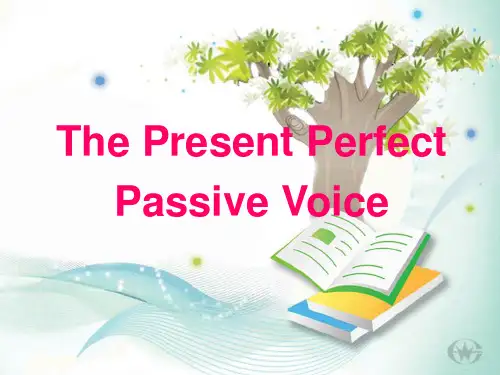
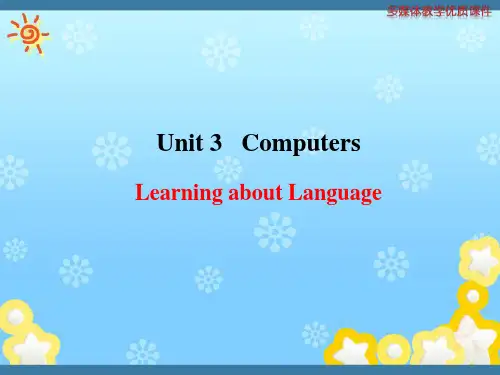
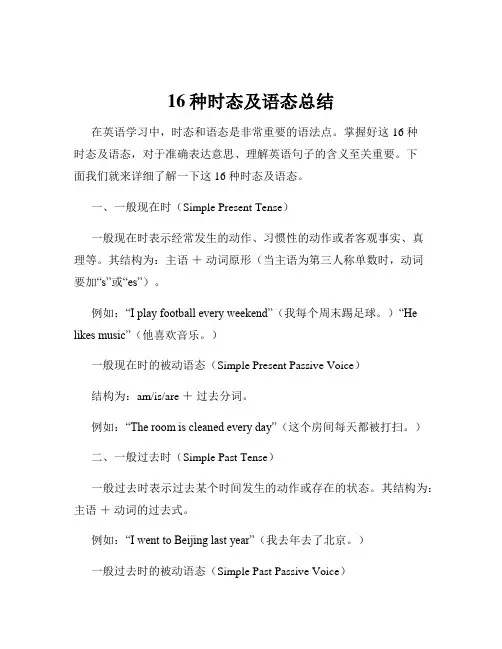
16种时态及语态总结在英语学习中,时态和语态是非常重要的语法点。
掌握好这 16 种时态及语态,对于准确表达意思、理解英语句子的含义至关重要。
下面我们就来详细了解一下这 16 种时态及语态。
一、一般现在时(Simple Present Tense)一般现在时表示经常发生的动作、习惯性的动作或者客观事实、真理等。
其结构为:主语+动词原形(当主语为第三人称单数时,动词要加“s”或“es”)。
例如:“I play football every weekend”(我每个周末踢足球。
)“He likes music”(他喜欢音乐。
)一般现在时的被动语态(Simple Present Passive Voice)结构为:am/is/are +过去分词。
例如:“The room is cleaned every day”(这个房间每天都被打扫。
)二、一般过去时(Simple Past Tense)一般过去时表示过去某个时间发生的动作或存在的状态。
其结构为:主语+动词的过去式。
例如:“I went to Beijing last year”(我去年去了北京。
)一般过去时的被动语态(Simple Past Passive Voice)结构为:was/were +过去分词。
例如:“The book was written by him”(这本书是他写的。
)三、一般将来时(Simple Future Tense)一般将来时表示将来要发生的动作或存在的状态。
其结构有多种,常见的有:will +动词原形、be going to +动词原形。
例如:“I will visit my grandparents tomorrow”(我明天将去看望我的祖父母。
)“She is going to have a party next week”(她下周要举办一个派对。
)一般将来时的被动语态(Simple Future Passive Voice)结构为:will be +过去分词、be going to be +过去分词。
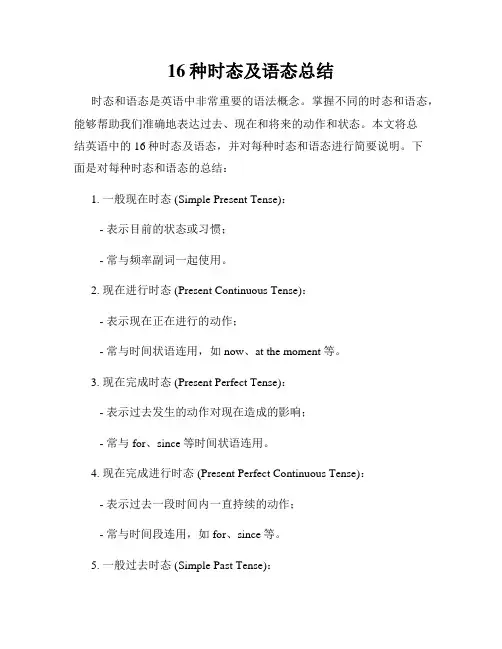
16种时态及语态总结时态和语态是英语中非常重要的语法概念。
掌握不同的时态和语态,能够帮助我们准确地表达过去、现在和将来的动作和状态。
本文将总结英语中的16种时态及语态,并对每种时态和语态进行简要说明。
下面是对每种时态和语态的总结:1. 一般现在时态 (Simple Present Tense):- 表示目前的状态或习惯;- 常与频率副词一起使用。
2. 现在进行时态 (Present Continuous Tense):- 表示现在正在进行的动作;- 常与时间状语连用,如now、at the moment等。
3. 现在完成时态 (Present Perfect Tense):- 表示过去发生的动作对现在造成的影响;- 常与for、since等时间状语连用。
4. 现在完成进行时态 (Present Perfect Continuous Tense):- 表示过去一段时间内一直持续的动作;- 常与时间段连用,如for、since等。
5. 一般过去时态 (Simple Past Tense):- 表示过去发生的动作或状态;- 常与表示具体时间的状语连用。
6. 过去进行时态 (Past Continuous Tense):- 表示过去某个时间段内正在进行的动作;- 常与表示具体时间的状语连用。
7. 过去完成时态 (Past Perfect Tense):- 表示过去某个时间点之前已经发生的动作;- 常与表示具体时间的状语连用。
8. 过去完成进行时态 (Past Perfect Continuous Tense): - 表示过去某个时间点之前一直持续的动作;- 常与表示具体时间的状语连用。
9. 一般将来时态 (Simple Future Tense):- 表示将来要发生的动作或状态;- 常与表示将来时间的状语连用。
10. 将来进行时态 (Future Continuous Tense):- 表示将来某一时刻正在进行的动作;- 常与表示将来时间的状语连用。
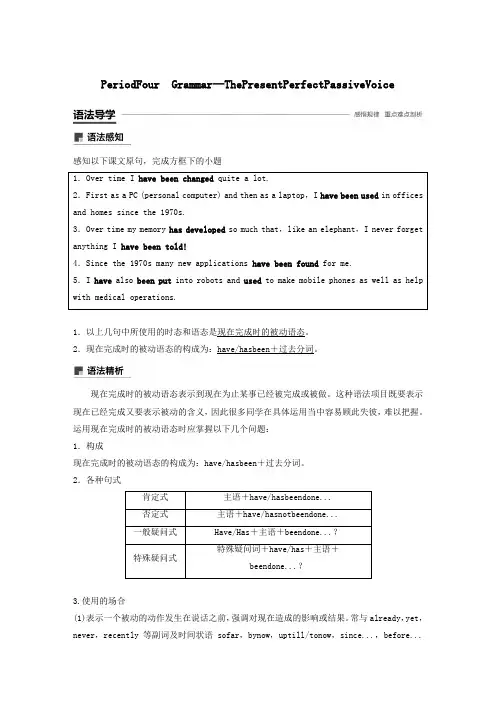
PeriodFour Grammar—ThePresentPerfectPassiveVoice感知以下课文原句,完成方框下的小题1.Over time I have been changed quite a lot.2.First as a PC (personal computer) and then as a laptop,I have been used in offices and homes since the 1970s.3.Over time my memory has developed so much that,like an elephant,I never forget anything I have been told!4.Since the 1970s many new applications have been found for me.5.I have also been put into robots and used to make mobile phones as well as help with medical operations.1.以上几句中所使用的时态和语态是现在完成时的被动语态。
2.现在完成时的被动语态的构成为:have/hasbeen+过去分词。
现在完成时的被动语态表示到现在为止某事已经被完成或被做。
这种语法项目既要表示现在已经完成又要表示被动的含义,因此很多同学在具体运用当中容易顾此失彼,难以把握。
运用现在完成时的被动语态时应掌握以下几个问题:1.构成现在完成时的被动语态的构成为:have/hasbeen+过去分词。
2.各种句式肯定式主语+have/hasbeendone...否定式主语+have/hasnotbeendone...一般疑问式Have/Has+主语+beendone...?特殊疑问式特殊疑问词+have/has+主语+beendone...?3.使用的场合(1)表示一个被动的动作发生在说话之前,强调对现在造成的影响或结果。
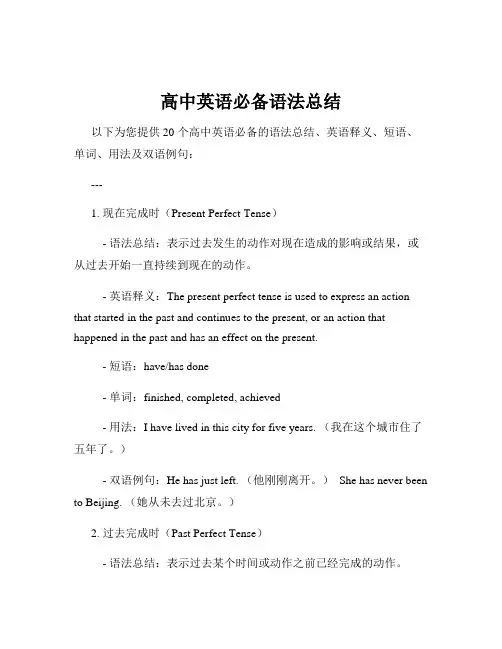
高中英语必备语法总结以下为您提供 20 个高中英语必备的语法总结、英语释义、短语、单词、用法及双语例句:---1. 现在完成时(Present Perfect Tense)- 语法总结:表示过去发生的动作对现在造成的影响或结果,或从过去开始一直持续到现在的动作。
- 英语释义:The present perfect tense is used to express an action that started in the past and continues to the present, or an action that happened in the past and has an effect on the present.- 短语:have/has done- 单词:finished, completed, achieved- 用法:I have lived in this city for five years. (我在这个城市住了五年了。
)- 双语例句:He has just left. (他刚刚离开。
) She has never been to Beijing. (她从未去过北京。
)2. 过去完成时(Past Perfect Tense)- 语法总结:表示过去某个时间或动作之前已经完成的动作。
- 英语释义:The past perfect tense indicates an action that was completed before another past action or time.- 短语:had done- 单词:gone, been, seen- 用法:By the time I arrived, they had already left. (我到的时候,他们已经离开了。
)- 双语例句:She had studied English for five years before she moved to the UK. (在她搬到英国之前,她已经学了五年英语。
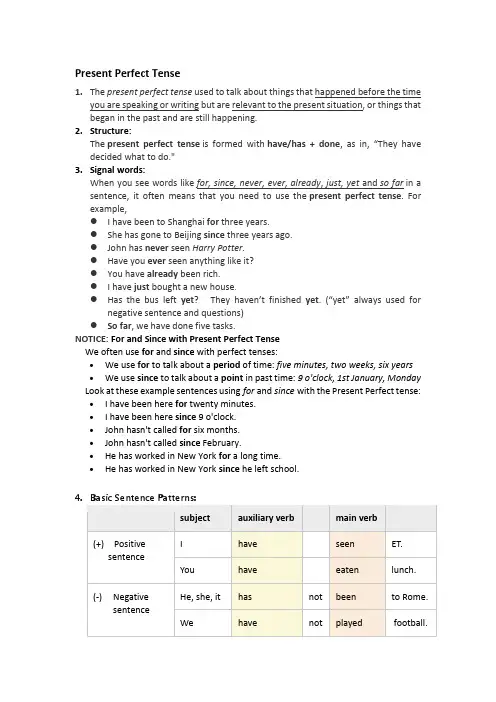
Present Perfect Tense1.The present perfect tense used to talk about things that happened before the timeyou are speaking or writing but are relevant to the present situation, or things that began in the past and are still happening.2.Structure:The present perfect tense is formed with have/has + done, as in, “They have decided what to do."3.Signal words:When you see words like for, since, never, ever, already, just, yet and so far in a sentence, it often means that you need to use the present perfect tense. For example,●I have been to Shanghai for three years.●She has gone to Beijing since three years ago.●John has never seen Harry Potter.●Have you ever seen anything like it?●You have already been rich.●I have just bought a new house.●Has the bus left yet? They haven’t finished yet. (“yet” always used fornegative sentence and questions)●So far, we have done five tasks.NOTICE: For and Since with Present Perfect TenseWe often use for and since with perfect tenses:•We use for to talk about a period of time: five minutes, two weeks, six years •We use since to talk about a point in past time: 9 o'clock, 1st January, Monday Look at these example sentences using for and since with the Present Perfect tense: •I have been here for twenty minutes.•I have been here since 9 o'clock.•John hasn't called for six months.•John hasn't called since February.•He has worked in New York for a long time.•He has worked in New York since he left school.4.(+)Positivesentence(-)N egativesentence(?)General question(?)Special question5.When we use the Present Perfect in speaking, we often contract the subject and auxiliary verb. We also sometimes do this in informal writing. I have →I've You have → You've He has → He's She has →She'sIt has → It's John has →John's The car has →The car's We have → We've They have →They've • You've told me that before. • John's seen Harry Potter .In negative sentences, we may contract the auxiliary verb and "not": • You haven't got a chance. • She hasn't heard from him.He's or he's Be careful! The 's contraction is used for the auxiliary verbs have and be . For example, "It's eaten" can mean: • It has eaten. (Present Perfect tense, active voice) • It is eaten. (Present Simple tense, passive voice) It is usually clear from the context.6. How do we use the Present Perfect Tense We use the Present Perfect to talk about: • experience • change• continuing situation1). Present Perfect for experienceWe often use the Present Perfect to talk about experience from the past. We areConnection with past: the event was in the pastConnection with present: in my head, now, I have a memory of the event;I know something about the event; I have experience of it2). Present Perfect for changeWe often use the Present Perfect to talk about a continuing situation. This is a state that started in the past and continues in the present (and will probably continue into the future). This is a situation (not an action). We usually use for or since with thisExercise:I.Fill in the blanks with the proper form.1.I____already____(see)the film.I________(see)it last week.2._____he____(finish)his work today?Not yet.3.My father____just____(come)back from work.He is tired now.4.Where’s Li Ming?He__________(go)to the teacher’s office.5.I__________(work)here since I______(move)here in1999.6.So far I_______________(make)quite a few friends here.7.How long________the Wangs______________(stay)here?For two weeks.8.I________just___________(finish)my homework.9.He________(go)to school on foot every day.10.____you______(find)your science book yet?11.If it____(be)fine tomorrow,I'll go with you.12.The students____________(read)English when the teacher came in.13.Look!The monkey__________(climb)the tree.14.My mother__________(come)to see me next Sunday.15.I've lost my pen._________you________(see)it anywhere?II.Rewrite the sentences.1.I have been to Macau before.Negative sentence: I__________________been to Macau before.2.He hasn’t come to school because he was ill.(ask for the underlined information) Special question: _____________he come to school?3.I bought a new bike just now.(Rewrite the sentence with “just”)I____just____a new bike.4.We began to learn English three years ago. (rewrite the sentence in present perfect tense)We________English____three years.5.They have been here since2000.(ask for the underlined information)Special question: ______________have they been here?6.The old man_________last year.He has______________for a year.(fill in the blanks with the proper form of “die”)7.Miss Gao left an hour ago.(rewrite the sentence in present perfect tense)Miss Gao has_______________________an hour.III. Use“never,ever,already,just,yet,for,since” to fill in the blanks.1.I have_______seen him before,so I have no idea about him.2.Jack has_________finished his homework.3.Mr.Wang has taught in this school________ten years.4.“Have you________seen the film?”“No,I have________seen it.”5.“Has the bus left_______?”“Yes,it has_________left.”。
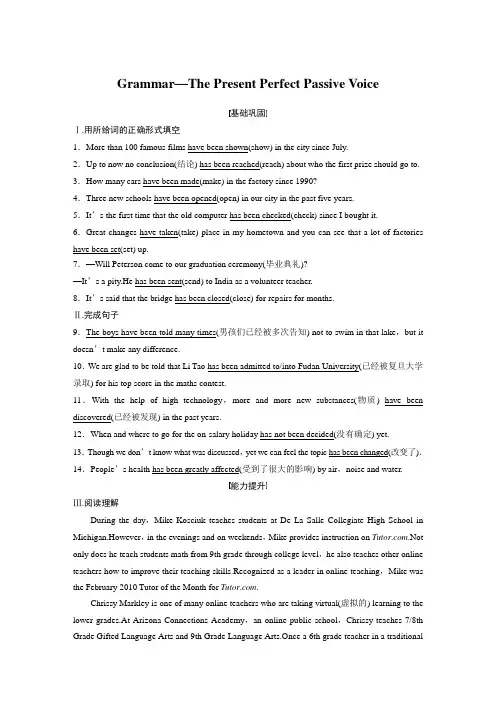
Grammar—The Present Perfect Passive Voice基础巩固Ⅰ.用所给词的正确形式填空1.More than 100 famous films have been shown(show) in the city since July.2.Up to now no conclusion(结论) has been reached(reach) about who the first prize should go to. 3.How many cars have been made(make) in the factory since 1990?4.Three new schools have been opened(open) in our city in the past five years.5.It’s the first time that the old computer has been checked(check) since I bought it.6.Great changes have taken(take) place in my hometown and you can see that a lot of factories have been set(set) up.7.—Will Peterson come to our graduation ceremony(毕业典礼)?—It’s a pity.He has been sent(send) to India as a volunteer teacher.8.It’s said that the bridge has been closed(close) for repairs for months.Ⅱ.完成句子9.The boys have been told many times(男孩们已经被多次告知) not to swim in that lake,but it doesn’t make any difference.10.We are glad to be told that Li Tao has been admitted to/into Fudan University(已经被复旦大学录取) for his top score in the maths contest.11.With the help of high technology,more and more new substances(物质) have been discovered(已经被发现) in the past years.12.When and where to go for the on-salary holiday has not been decided(没有确定) yet. 13.Though we don’t know what was discussed,yet we can feel the topic has been changed(改变了).14.People’s health has been greatly affected(受到了很大的影响) by air,noise and water.能力提升Ⅲ.阅读理解During the day,Mike Kosciuk teaches students at De La Salle Collegiate High School in Michigan.However,in the evenings and on weekends,Mike provides instruction on .Not only does he teach students math from 9th grade through college level,he also teaches other online teachers how to improve their teaching skills.Recognized as a leader in online teaching,Mike was the February 2010 Tutor of the Month for .Chrissy Markley is one of many online teachers who are taking virtual(虚拟的) learning to the lower grades.At Arizona Connections Academy,an online public school,Chrissy teaches 7/8th Grade Gifted Language Arts and 9th Grade Language Arts.Once a 6th grade teacher in a traditionalpublic school area,Chrissy enjoys teaching in the virtual classroom.Recognized as an excellent teacher,she was named the school’s 2011 Teacher of the Year.Having ten years’ experience in online teaching,Jody Shine began teaching with Davenport University.When she was asked to teach online,she was skeptical at first.“I feared something would be lost in the give and take of classroom discussion,” Jody said.“Now I know online teaching allows students greater freedom to express themselves.”Today,Jody uses voice recordings and online videos to teach English Composition to Davenport students.Like Arizona Connections Academy,Open High School of Utah is also a public school offering online instruction.There,Amy Pace is an award-winning(获奖的) science teacher.After spending 11 years in a traditional teaching environment,Amy joined Open High School of Utah.She has helped create an interesting science course.In 2010,she was one of 103 7th to 12th grade teachers to be chosen for a Presidential Award for Excellence in Mathematics and Science Teaching.15.What subject does Mike teach?A.English Composition. B.Language Arts.C.Science. D.Math.答案 D解析细节理解题。
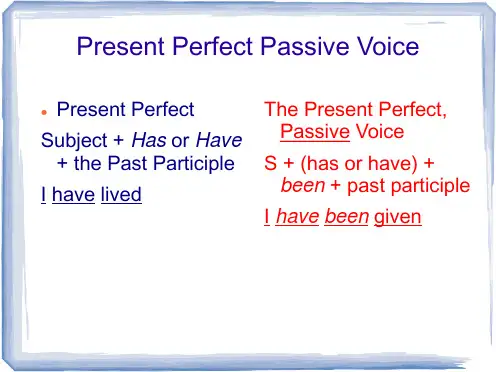
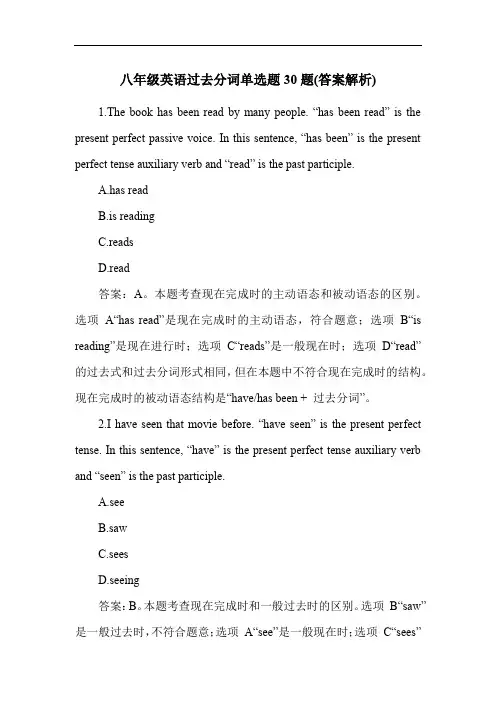
八年级英语过去分词单选题30题(答案解析)1.The book has been read by many people. “has been read” is the present perfect passive voice. In this sentence, “has been” is the present perfect tense auxiliary verb and “read” is the past participle.A.has readB.is readingC.readsD.read答案:A。
本题考查现在完成时的主动语态和被动语态的区别。
选项A“has read”是现在完成时的主动语态,符合题意;选项B“is reading”是现在进行时;选项C“reads”是一般现在时;选项D“read”的过去式和过去分词形式相同,但在本题中不符合现在完成时的结构。
现在完成时的被动语态结构是“have/has been + 过去分词”。
2.I have seen that movie before. “have seen” is the present perfect tense. In this sentence, “have” is the present perfect tense auxiliary verb and “seen” is the past participle.A.seeB.sawC.seesD.seeing答案:B。
本题考查现在完成时和一般过去时的区别。
选项B“saw”是一般过去时,不符合题意;选项A“see”是一般现在时;选项C“sees”是一般现在时的第三人称单数形式;选项D“seeing”是现在分词。
现在完成时表示过去发生的动作对现在造成的影响或结果,结构是“have/has + 过去分词”。
3.The work has been finished by them. “has been finished” is the present perfect passive voice. In this sentence, “has been” is the present perfect tense auxiliary verb and “finished” is the past participle.A.has finishB.is finishingC.finishesD.finished答案:D。
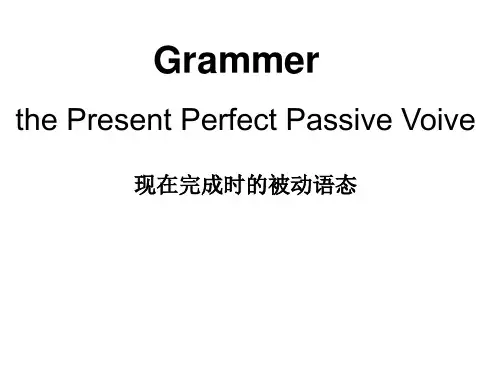
Grammar—The Present Perfect Passive Voice语法感知感知以下课文原句,完成方框下的小题1.Over time I have been changed quite a lot.2.First as a PC (personal computer) and then as a laptop,I have been used in offices and homes since the 1970s.3.Over time my memory has developed so much that,like an elephant,I never forget anything I have been told!4.Since the 1970s many new applications have been found for me.5.I have also been put into robots and used to make mobile phones as well as help with medical operations.1.以上几句中所使用的时态和语态是现在完成时的被动语态。
2.现在完成时的被动语态的构成为:have/has been+过去分词。
语法精析现在完成时的被动语态表示到现在为止某事已经被完成或被做。
这种语法项目既要表示现在已经完成又要表示被动的含义,因此很多同学在具体运用当中容易顾此失彼,难以把握。
运用现在完成时的被动语态时应掌握以下几个问题:1.构成现在完成时的被动语态的构成为:have/has been+过去分词。
2.各种句式肯定式主语+have/has been done...否定式主语+have/has not been done...一般疑问式Have/Has+主语+been done...?特殊疑问式特殊疑问词+have/has+主语+been done...?3.使用的场合(1)表示一个被动的动作发生在说话之前,强调对现在造成的影响或结果。